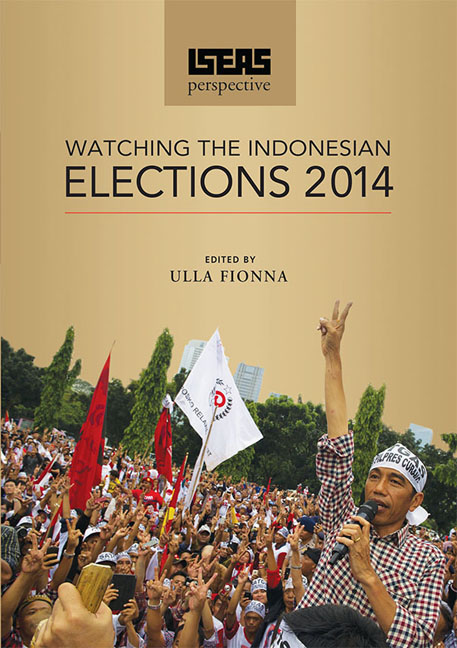Book contents
- Frontmatter
- Contents
- Foreword
- Introduction
- 1 The Gubernatorial Race in Jakarta: Background and Implications
- 2 Indonesian Parties Struggle for Electability
- 3 Who Will Be Indonesian President in 2014?
- 4 Indonesian Presidential Election Forcing Rejuvenation of Parties
- 5 Resisting Democracy: Front Pembela Islam and Indonesia's 2014 Elections
- 6 Getting to Know the Contestants of the 2014 Indonesian Parliamentary Elections
- 7 A Snapshot of the Campaigning in Indonesia's 2014 Legislative Elections
- 8 Unpacking the Results of the 2014 Indonesian Legislative Elections
- 9 Indonesia's 2014 Legislative Elections: The Dilemmas of “Elektabilitas” Politics
- 10 The Islamic Factor in the 2014 Indonesian Elections
- 11 Vote-buying in Indonesia's 2014 Elections: The Other Side of the Coin
- 12 Gap Narrows Between Candidates in Indonesian Presidential Elections
- 13 Analysing the Economic Platforms in the Indonesian Presidential Election
- 14 Indonesian Islamic Parties After the 2014 Elections: Divided and Self-Centred
- 15 Safeguarding Indonesia's Pluralism: An Essential Task for Joko Widodo
- 16 Jokowi's Key Economic Challenge: Improving Fiscal Policy for Equitable Growth
- 17 Crossing the River While Avoiding the Stones: Jokowi's Run-up to the Presidency
- 18 Post-elections Indonesia: Towards a Crisis of Government?
- Epilogue: Jokowi's First Months: Compromise Cabinet, Subsidy Cuts, and Corrupt Coalition
15 - Safeguarding Indonesia's Pluralism: An Essential Task for Joko Widodo
Published online by Cambridge University Press: 29 July 2017
- Frontmatter
- Contents
- Foreword
- Introduction
- 1 The Gubernatorial Race in Jakarta: Background and Implications
- 2 Indonesian Parties Struggle for Electability
- 3 Who Will Be Indonesian President in 2014?
- 4 Indonesian Presidential Election Forcing Rejuvenation of Parties
- 5 Resisting Democracy: Front Pembela Islam and Indonesia's 2014 Elections
- 6 Getting to Know the Contestants of the 2014 Indonesian Parliamentary Elections
- 7 A Snapshot of the Campaigning in Indonesia's 2014 Legislative Elections
- 8 Unpacking the Results of the 2014 Indonesian Legislative Elections
- 9 Indonesia's 2014 Legislative Elections: The Dilemmas of “Elektabilitas” Politics
- 10 The Islamic Factor in the 2014 Indonesian Elections
- 11 Vote-buying in Indonesia's 2014 Elections: The Other Side of the Coin
- 12 Gap Narrows Between Candidates in Indonesian Presidential Elections
- 13 Analysing the Economic Platforms in the Indonesian Presidential Election
- 14 Indonesian Islamic Parties After the 2014 Elections: Divided and Self-Centred
- 15 Safeguarding Indonesia's Pluralism: An Essential Task for Joko Widodo
- 16 Jokowi's Key Economic Challenge: Improving Fiscal Policy for Equitable Growth
- 17 Crossing the River While Avoiding the Stones: Jokowi's Run-up to the Presidency
- 18 Post-elections Indonesia: Towards a Crisis of Government?
- Epilogue: Jokowi's First Months: Compromise Cabinet, Subsidy Cuts, and Corrupt Coalition
Summary
INTRODUCTION
As the largest Muslim-majority country and the fourth most populous nation in the world, Indonesia has often been cited as an example of Islam, democracy and economic development coexisting. However, while the country has long been hailed for its tolerant form of Islam, the pluralistic model of Indonesian society has been threatened by the growth of religious intolerance in recent years. While members from the Jemaah Islamiyah have been hunted down, shot by the police or thrown into prison, the Indonesian authorities under President Yudhoyono have been much less adamant in protecting the rights of religious minorities and bringing to justice the various radical groups that have perpetrated violent acts against them.
On 9 July 2014 Indonesians voted in their fifth president since the fall of the Suharto regime in 1998. This article investigates the prospects of the new Jokowi-Kalla administration in light of problems of growing sectarianism in Indonesia. Indeed, with the election of Joko Widodo, Indonesia may have avoided a possible return to authoritarian rule, but also a further increase of tensions around religious issues. The president-elect's rival, Prabowo Subianto is known to have had links with radical elements of Indonesian Islam since the mid-1990s. It is therefore not surprising that, during the campaign, Islamist parties and radical groups threw their weight behind the Prabowo-Hatta ticket, hoping that their demand for a greater Islamization of Indonesian society would be accepted. As an example, the Islamic Defenders Front (FPI, Front Pembela Islam), while first hesitant to support Prabowo, later called to vote for him, hoping that he would favour the growth of local sharia by-laws (perda syari'ah). With the Constitutional Court's decision to confirm Jokowi's victory on 21 August, it will never be known whether an elected Prabowo would have turned his back on his Islamist and neo-fundamentalist supporters or, on the contrary, if he would have bought social peace by giving in to their demands.
However, what is certain now is that Joko Widodo and Jusuf Kalla face an important and difficult task in preserving one of the county's main assets — its pluralist and tolerant model — while carefully managing the possible tensions created by the rapidly changing religious landscape of Indonesian society.
- Type
- Chapter
- Information
- ISEAS PerspectiveWatching the Indonesian Elections 2014, pp. 137 - 146Publisher: ISEAS–Yusof Ishak InstitutePrint publication year: 2015

